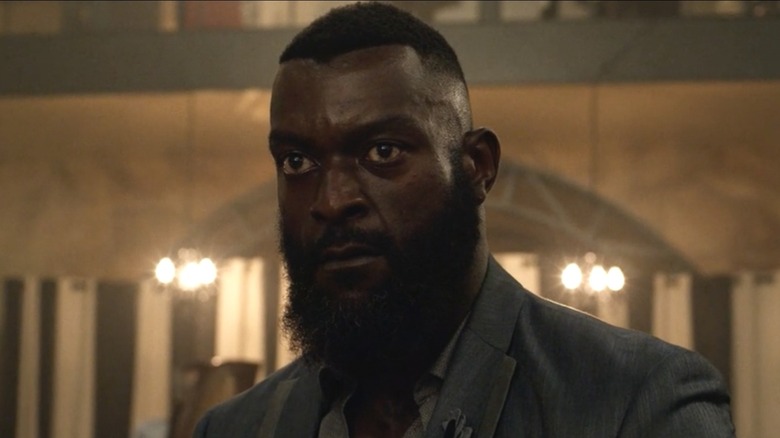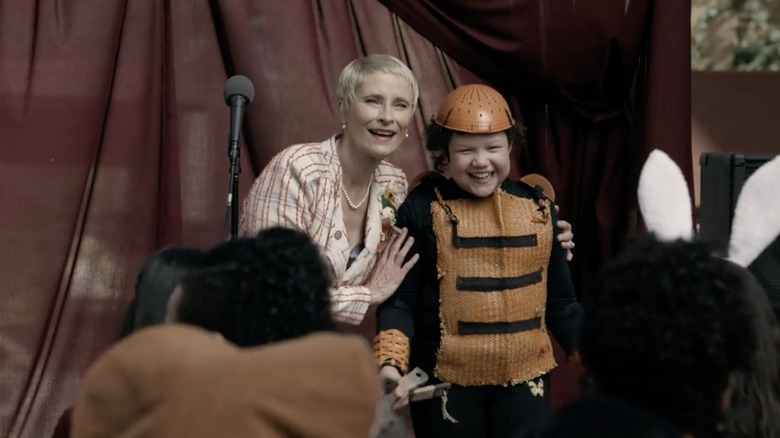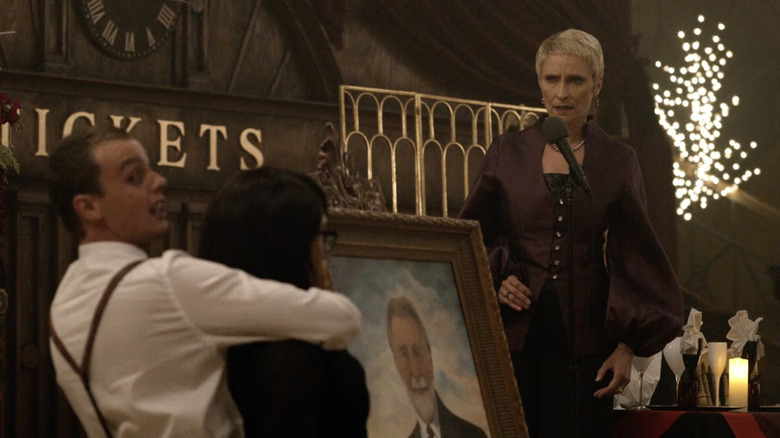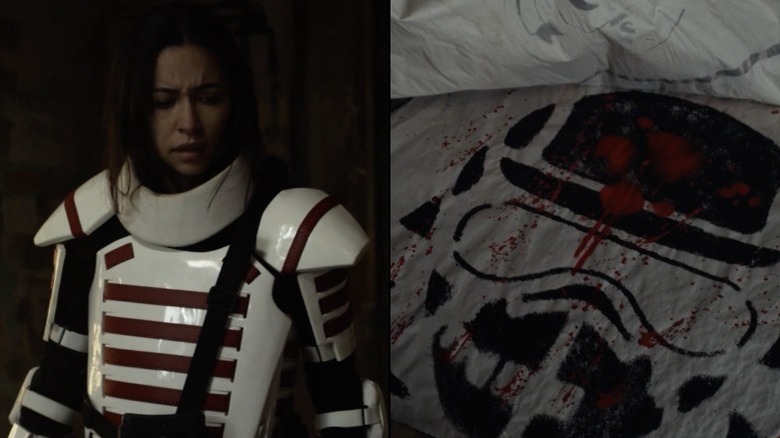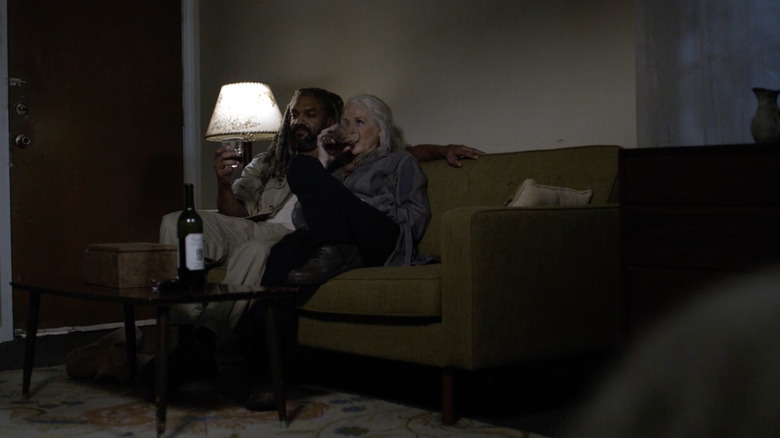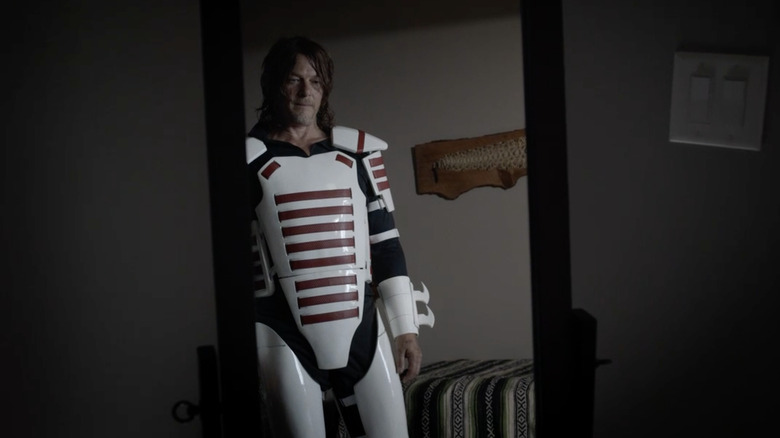The Ending Of The Walking Dead Season 11 Episode 10 Explained
With a dizzying array of spin-offs on the horizon, it hardly feels like "The Walking Dead" is approaching the end of a twelve-year run. However, the original apocalyptic AMC series' three-part final season is back from hiatus to deliver the next batch of episodes. Season 11 Episode 9 saw a shocking decision made by Maggie Rhee (Lauren Cohan) as well as the Commonwealth's long-awaited arrival at the weather and walker-ravaged remains of Alexandria.
However, Episode 10, "New Haunts," continues showrunner Angela Kang's creative decision to play with non-chronological storytelling. This episode flashes forward to Day 30 of some survivors now living in the Commonwealth. Their cushy new community is going all-out for Halloween with a family-friendly festival filled with hot apple cider, homemade pastries, and a petting zoo. Judith Grimes (Cailey Fleming) even tries cotton candy for the first time in her life. Later, the town's elites attend a masquerade ball complete with a red carpet. The glamorous event sours when one worker's outburst offers a glimpse at how oppressive their social hierarchies are, revealing a growing resistance among those at the bottom of this food chain.
Something sinister is bubbling beneath the surface of the Commonwealth, and the newcomers are slowly realizing that this return to pre-apocalyptic life comes with all of the old baggage they thought was behind them.
Let's break down what happened in Season 11 Episode 10, "New Haunts."
Adjusting to life in the Commonwealth
Of all the communities that have come and gone on "The Walking Dead," the Commonwealth most closely resembles a city from before the world was overrun by walkers. Its citizens have embraced the return to normalcy, but for those relocating from Alexandria, this causes culture shock. Magna (Nadia Hilker), who is back to working as a waitress, points out that the Commonwealth is eerily similar to the past in that it imposes barriers to maintain a rigid social structure that only benefits a select few.
Their society is based on a numerical ranking system that affects people's healthcare, access to living spaces, food options, invitations to events, and so forth. Lower-ranked people like Daryl Dixon (Norman Reedus) and Rosita Espinosa (Christian Serratos) live in run-down apartments on the outskirts of town and work in dangerous conditions to prove their abilities to higher-ups like General Mercer (Michael James Shaw).
Meanwhile, those who are benefitting from this system live in a glossy bubble. Judith's new friend, Mei (Chiara Misawa), gushes about how cool it is that she got to live among the undead and is surprised to find out that she doesn't get an allowance. On the other hand, Sebastian Milton (Teo Rapp-Olsson) cosplays as a rugged survivor, treating killing walkers like a game rather than a life-or-death situation. The higher one's position is in the Commonwealth, the less they understand about the lives of those below them.
The masquerade ball gone wrong
In an utterly dystopian move, the mysterious Commonwealth Governor Pamela Milton (Laila Robins) throws an exclusive masquerade ball, where the commoners stand outside and ask for autographs as the attendees stroll down the red carpet.
However, this glitzy affair isn't just for the rich and famous — it's also attended by wait staff and the press. Connie (Lauren Ridloff) and Kelly (Angel Theory) interview Milton for the newspaper, and she effortlessly evades answering any of their questions. "We appreciate and celebrate every single person who contributes to our vibrant community," she replies to a query about the apparent class divide.
As if to prove Milton wrong, a demoted soldier named Tyler (Cameron Roberts) interrupts her self-aggrandizing speech and takes Max/Stephanie (Margot Bingham) hostage as he rails against her claims about equality within the Commonwealth. Instead of hurting anyone, though, he slashes the newly unveiled portrait of Milton's father, a former U.S. president, then escapes.
Daryl captures Tyler and talks him down but hands him over for Sebastian to bring back to the party. As he's taken away, he shouts: "Resist the Commonwealth! Visibility for workers! Equality for all!" He also reveals that there is a resistance of "thousands of others" just like him. Curiously, Max/Stephanie whispers to him, "I'm like you."
Showrunner Angela Kang explained in the Episode Insider segment that they "wanted to leave that question hanging" of whether or not there was a movement within the Commonwealth. The final scene of "New Haunts" suggests that this might be the case.
Come on, baby, eat the rich
Fast-forwarding to Day 33, Tyler's assertion that there is a resistance surging within the Commonwealth is seemingly proven true during a raid of his apartment. Rosita, who is now a soldier, stumbles into a hidden room decked out with propaganda — including shooting targets depicting their uniforms. In the Episode Insider, Kang explains that Rosita is overwhelmed with this information and finds herself at a "really odd crossroads."
Her revelation is soundtracked by the Motörhead album Mei had gifted Judith. Now that Daryl is a soldier, he's moved them into a new apartment and has money for luxuries like a record player. They put the album on, and Judith skips ahead to Track 2, "Eat the Rich." The not-so-subtle political song hammers on as Rosita realizes that, for the first time, she's on the opposing side of a rebellion.
Throughout the apocalypse, her scrappy group has always fought for what they believed in and avoided conforming to another community. After all, what better time for a social and political overhaul than the end of the world? However, as they get comfortable with life in the Commonwealth, this could change.
Will they go against the grain and join this alleged resistance, or will they fight to defend this new, old-world community? Is this what further splinters the groups, leading to the apparent standoff between Maggie/Hilltop and Daryl/Commonwealth foreshadowed in "No Other Way"? Or will this season's storylines align with the Commonwealth's arc in the comics?
What's next for Carol and Ezekiel?
As the Alexandria and Hilltop transplants settle into the Commonwealth, it's clear that Daryl is having the most challenging time adjusting. However, Carol Peletier (Melissa McBride) is back to leaning into her trusted syrupy sweet persona that allows her to slide under the radar as she snoops. Daryl's skepticism is overt; Carol plays a character to pretend like she's onboard while scoping everything out.
Although her marriage to Ezekiel (Khary Payton) has crumbled, she still cares for him and is working to ensure that his thyroid cancer is being managed. His low social ranking in the Commonwealth places him near the bottom of the treatment list, and it becomes her mission to change this. She successfully weasels her way into somewhat of an alliance with Deputy Governor Lance Hornsby (Josh Hamilton), but this will be a long game.
Meanwhile, Ezekiel appears to have accepted his fate as he lies to Carol about his condition and begins gifting sacred possessions to his loved ones. The former couple split a bottle of wine, and he suggests that their new home might offer a "fresh start." She goes along with this sentiment, but it's clear that she isn't giving up.
Because of the upcoming spin-off that follows Daryl and Carol, we know that she survives whatever happens in Season 11. Ezekiel's future is still a mystery, though, and it's heartbreaking to think that she could suffer the loss of yet another family member.
What's going on with the timeline?
"The Walking Dead" has always had a complex timeline, but Season 11 has taken things to another level. "No Other Way" and "New Haunts" feature time jumps, making the who, when, and why of the conflict between the Commonwealth and the other groups unclear. For all we know, these scenes from circa Day 30 won't come into play until the final batch of episodes is released later this year.
In an interview with NME, Angela Kang explained that the time jumps help to make the show feel fresh again. "Every episode picked up right in the next moment. That was great because it created cliffhangers, but I just found myself wanting to mess with the rhythm of the show a little bit," she said. "It was great in creating a sense of urgency — but when you're always picking up off the last episode, you can't progress certain things very far."
These glimpses into what's coming next allow fans to theorize about how each character winds up in the position that they do as the long-running series comes to a close. Is the end goal that the Commonwealth absorbs all the remaining survivor groups, gradually rebuilding the world this way? Or is it a domineering force that sets out to conquer anyone who might disrupt their plans to restore the world to what it once was?
New episodes of "The Walking Dead" air on AMC on Sundays at 9/8c, and AMC+ users have early access to episodes every week.
